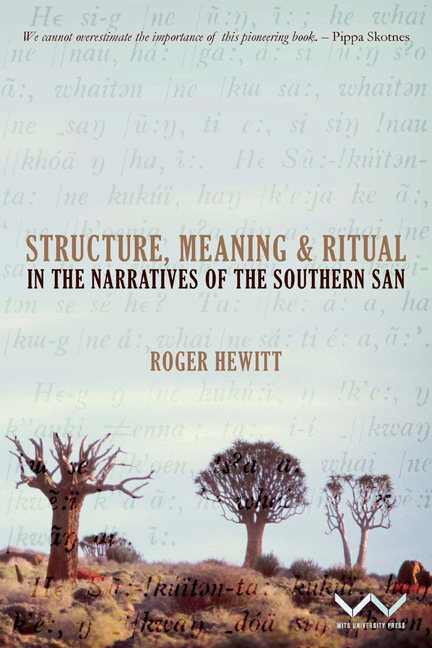Book contents
- Frontmatter
- Dedication
- Contents
- Acknowledgements
- Introduction
- 1 Ethnographic background
- 2 Introduction to the narratives: their context, performance and scope
- 3 Legends and the stories of !Khwa
- 4 Sidereal narratives: the story of the Dawn's Heart and his wife the Lynx
- 5 Animal narratives
- 6 |Kaggen in belief and ritual
- 7 The |Kaggen narratives (1): characters and content
- 8 The |Kaggen narratives (2): sequence and structure
- 9 |Kaggen in belief, ritual and narrative: a synthesis
- 10 Two |Kaggen narratives: compositional variations
- 11 The verbal surface: a note on the narrators
- Appendix A Girls’ puberty observances of the ǀXam
- Appendix B The shamans of the ǀXam
- Bibliography
- Index
11 - The verbal surface: a note on the narrators
Published online by Cambridge University Press: 21 April 2018
- Frontmatter
- Dedication
- Contents
- Acknowledgements
- Introduction
- 1 Ethnographic background
- 2 Introduction to the narratives: their context, performance and scope
- 3 Legends and the stories of !Khwa
- 4 Sidereal narratives: the story of the Dawn's Heart and his wife the Lynx
- 5 Animal narratives
- 6 |Kaggen in belief and ritual
- 7 The |Kaggen narratives (1): characters and content
- 8 The |Kaggen narratives (2): sequence and structure
- 9 |Kaggen in belief, ritual and narrative: a synthesis
- 10 Two |Kaggen narratives: compositional variations
- 11 The verbal surface: a note on the narrators
- Appendix A Girls’ puberty observances of the ǀXam
- Appendix B The shamans of the ǀXam
- Bibliography
- Index
Summary
Of the six main informants used by Bleek and Lloyd, ǀA!kungta and ǂKasing gave too few narratives for even the vaguest picture of their styles to emerge, while !Kweiten ta ǁken rarely managed to give a coherent performance in the conditions under which collecting took place. Her narratives are only occasionally free from interjections which run ahead of events in the plot, and it is clear that she found the method of transcription an obstacle to giving narratives animated by any real enthusiasm. The example of her performance of the story of the girl who killed the Waterchildren (mentioned in Chapter 4) is typical of her performance in general. Occasionally showing some engagement with the narrative, isolated passages stand out vividly from a basically perfunctory account of the main events. Little or no elaboration is given and snatches of chant or song are only very rarely included. Her narratives are also amongst the shortest in the collection, only occasionally exceeding 20 pages of manuscript, while some of the other informants gave narratives which run into hundreds of pages.
!Kweiten ta ǁken's performances point out the major problem of discussing the different styles of narration displayed by the various informants, for it is clear that what is available is not how the narrators told stories to ǀXam audiences, but how they responded to the particular situation of carefully dictating narratives in a completely alien environment to people of another race and culture. !Kweiten ta ǁken's performances can in no way be taken as indications of how she might have performed to a ǀXam audience, and, indeed, the times when she does manage to animate her narratives, suggest that under different circumstances her performance may have been quite different.
The informants who did achieve an ease in their narrations, under these conditions, were Dia!kwain (!Kweiten ta ǁken's brother), ǁKabbo, and ǀHang ǂkass'o, but even these informants were influenced in various ways by the situation in which they found themselves. Their styles will be discussed below. Before doing so, however, a few points can be made about the verbal techniques which were common to all of the narrators.
- Type
- Chapter
- Information
- Publisher: Wits University PressPrint publication year: 2008



